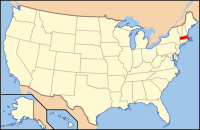
Alcohol laws of Massachusetts
Encyclopedia


Alcoholic Beverages Control Commission
The serving of alcohol in the Commonwealth of Massachusetts is governed by the ABCC which is responsible for issuing licenses and permits for all manufacturers, wholesalers and importers, out-of-state suppliers, brokers, salesman, warehouses, planes, trains, ships, ship chandlers and vehicles transporting alcoholic beverages.Drinking Age
On December 4th, 1984, Governor Michael S. Dukakis signed a bill raising the drinking age from 20 to 21 in Massachusetts. This bill was in response to the National Minimum Drinking Age ActNational Minimum Drinking Age Act
The National Minimum Drinking Age Act of 1984 was passed on July 17, 1984 by the United States Congress as a mechanism whereby all states would become thereafter required to legislate the age of 21 years as a minimum age for purchasing and publicly possessing alcoholic beverages...
which would reduce federal highway funding by 10% for any state that did not adopt a drinking age of 21.
Transportation of Alcohol
Individuals can transport alcohol without a license, up to but not exceeding, twenty gallons of malt beverages, three gallons of any other alcoholic beverage, or one gallon of alcohol at a single time. This is equivalent to 1 keg, or seven 30 racks of 12 oz beer, or three 1 liter bottles of hard alcohol. People under 21 years of age may not knowingly drive a car with alcohol inside unless they are accompanied by their legal guardian. This also means a person under the age of 21 cannot drive a vehicle with alcohol inside even if it belongs to a person over the age of 21 who is also inside the vehicle. Violators can be fined and/or have their driver's license suspended for three months.Drunk Driving
Driving under the influence of alcohol in Massachusetts is a crime that is punishable by a fine and/or imprisonment. Massachusetts' maximum blood alcohol level is 0.08% and 0.02% if the driver is under 21 years of age. Operating under the influence penalties can vary depending on prior OUI offenses.| Fine | Jail | Driver's License Suspension | |
|---|---|---|---|
| 1st Offense | $500-$5,000 | No Minimum - 2½ years | 1 year |
| 2nd Offense | $1,000 - $10,000 | 30 days - 2½ years | 2 years |
| 3rd Offense (felony) | $1,000 - $15,000 | 150 days - 5 years | 8 years |
| 4th Offense (felony) | $1,500 - $25,000 | 1 - 5 years | 10 years |
| 5th Offense (felony) | $20,000 - $50,000 | 2 - 5 years | Lifetime |
Social Host Law
The host of a party can be held liable for a guest who causes injury to others if it is proved that the host knew or should have known that the guest was intoxicated but continued to allow the guest to drink alcoholic beverages.See also
- Sumptuary lawSumptuary lawSumptuary laws are laws that attempt to regulate habits of consumption. Black's Law Dictionary defines them as "Laws made for the purpose of restraining luxury or extravagance, particularly against inordinate expenditures in the matter of apparel, food, furniture, etc." Traditionally, they were...

